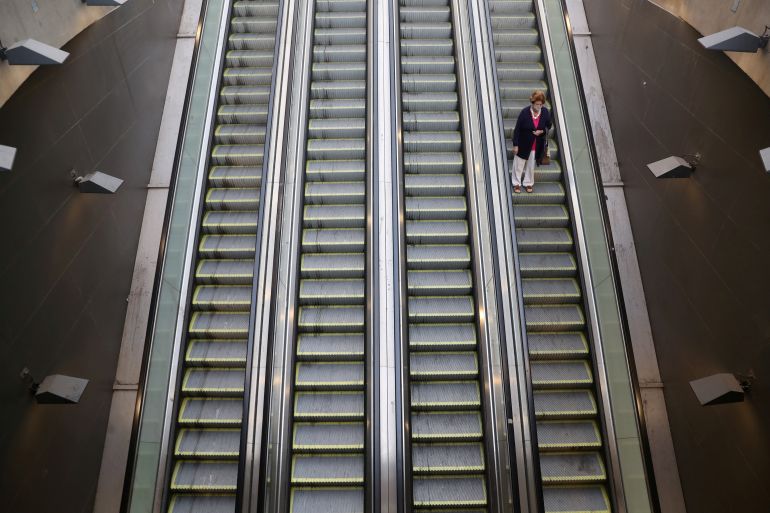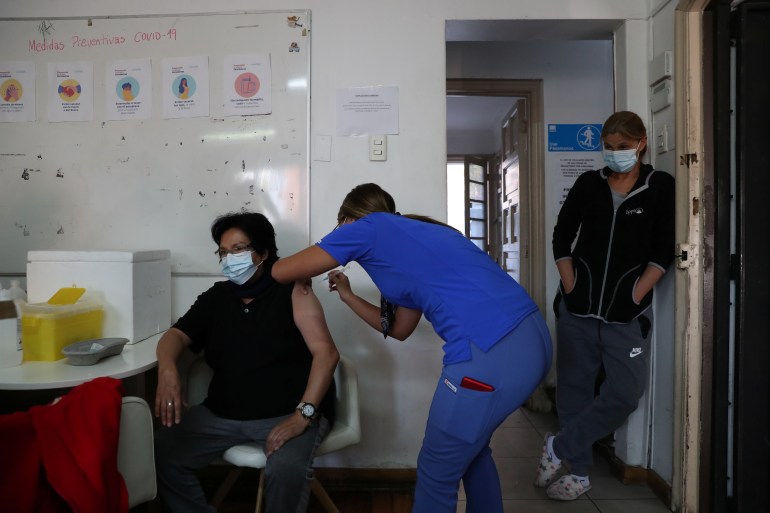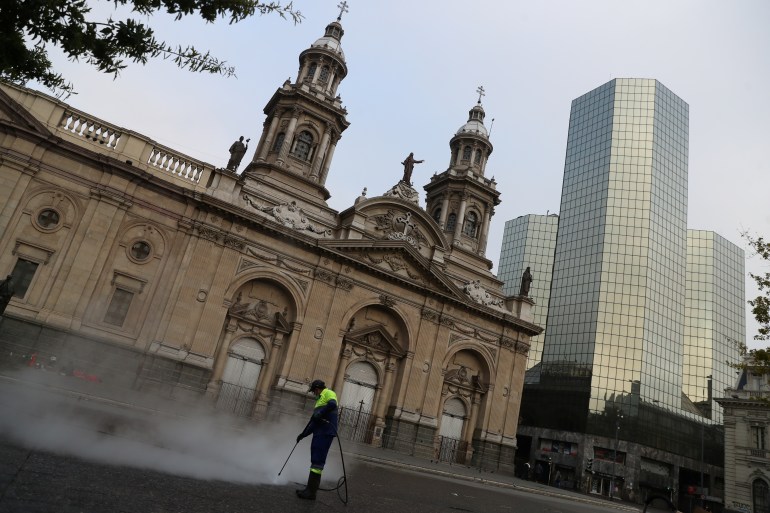As COVID cases spike, many Chileans fear toll of another lockdown
Despite successful vaccination drive, infections are increasing across Chile, exacerbating deep-seated inequalities.

Santiago, Chile – Since Santiago plunged into a strict, total lockdown to curb record rates of daily COVID-19 infections, Nilda Bravo is not sure when she can go back to her job as a housekeeper – or when she will next get paid.
“There’s so much uncertainty, you don’t know what’s going to happen from one day to the next,” the 63-year-old told Al Jazeera.
Keep reading
list of 4 itemsAlarming rise in COVID cases in Chile despite vaccination efforts
A new era for Chile?
A fight for survival among Chile’s Indigenous people
This week, daily COVID-19 cases countrywide surged past the 7,000 mark – the highest single-day tally in Chile since the pandemic first struck. New lockdown measures, in force since last week, are consequently stricter than before, too: residents can go out only twice a week to buy food and must present permissions to do so.
The government has shut down local markets and advised residents to use food delivery services, but Bravo said that is impossible for many Chileans – including her family. “There’s no money, as there’s no work, so how can we pay extra for someone to bring us food?” she said.
The alarming rise in cases comes at a time when Chile is one of the world’s most vaccinated countries, having administered at least one jab to a third of its 18 million population.
While other countries fretted over contractual decisions, Chile received international plaudits for anticipating demand and swiftly securing deals with several suppliers, including Pfizer-BioNTech, Sinovac, AstraZeneca-Oxford, and Johnson & Johnson.
Minister of Foreign Affairs Andres Allamand recently boasted during a news conference that Chile has been internationally commended for its vaccination drive “and general handling of the pandemic”.
Economic support
It is difficult to pinpoint the exact cause of the recent spike in infections.
But even before cases peaked, health experts criticised the government for prematurely lifting lockdown measures over the Chilean summer months, allowing vacations and opening shops, gyms, and restaurants across the country. They stressed that the vaccination campaign would take months to have an effect on culling infection rates.
Chile’s medical union called for direct economic support to households to help the population oblige quarantine rules. The government has committed to continue until June the disbursement of emergency support funds that range from $33 to $135 a month per person, depending on the time spent in lockdown.
But for many Chileans, the social security measures do not provide sufficient support – raising concerns about how they will survive another strict lockdown.

Olga Toro Devia, a public health professor at the University of Chile with a focus on mental health, said Chile’s vaccination success does not eclipse the problems caused by deep-seated inequality in the country.
“Countries that have more developed social security systems, where they have greater equality, have better conditions to respond to the pandemic,” she told Al Jazeera.
In Chile, 70 percent of the population earns below $750 a month and 82 percent of adults live in debt. Gaping inequality drove millions of Chileans to protest from October 2019 until March 2020, when the pandemic forced people off the streets and into quarantine.
The 2019 movement for equality and better standards of living resulted in Chileans voting to establish a new constitution, written by a popularly-elected, 155-member body. Polls to elect members of that body are expected later in the year.
‘We need much more’
But Chile’s lockdowns are likely to continue over the next month, with President Sebastian Piñera proposing to delay an upcoming two-day election process for constitutional candidates, mayors, and governors from April 11 to the end of May.
Giovanna Grandon, a 45-year-old mother of four and school bus driver in Santiago, is running as a candidate to write the new constitution. She has not been able to work since the pandemic started, and said the government is not taking sufficient care of people in vulnerable positions.
“It takes a month to receive the emergency fund payment, and in that month you don’t have money to eat,” she said.
Grandon emerged as a popular figure during the 2019 protests and says her voice represents the reality of common Chileans, beyond academics, lawyers, and politicians. She is campaigning under the slogan “Total quarantine with social support NOW”.
Chile has some of the strictest quarantine measures in Latin America, with a curfew that has extended for more than a year, as well as a state of emergency that allows the military to patrol the streets. Anyone found breaking the measures risks arrest, with police detaining more than 3,000 people daily under orders “to advance and fight against the pandemic”.
During the 2019 protests, Amnesty International and the United Nations were among several organisations that accused Chile’s police and military of committing serious human rights violations, including killings, torture, and sexual violence.
Grandon also condemned the government’s use of repression to enforce coronavirus lockdowns; she said she has been arrested and subject to police brutality on separate occasions, despite having the necessary permissions to leave her house.

“Before the pandemic, the Chilean armed forces were viewed unfavourably,” said Toro Devia, at the University of Chile, adding that using police and military to prevent contagion “is the wrong way” to do it.
She said authorities’ public policy communication has only “infantilised the citizen population, rather than treating them as subjects to rights”.
Meanwhile, Chile’s ambitious vaccination plan continues to roll out smoothly, with the country on track to accomplish its goal of vaccinating 80 percent of the population by June.
Bravo has now received her two vaccine doses – yet while she feels safer with the extra protection, she said the jabs alone are not enough to get by during the pandemic. “We need much more than just to be vaccinated.”